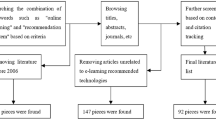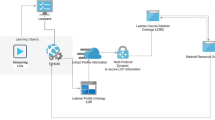Abstract
The rapid evolution of the Internet has resulted in the availability of huge volumes of online learning resources on the web. However, many learners encounter difficulties in retrieval of suitable online learning resources due to information overload. Besides, different learners have different learning needs arising from their differences in learner’s context and sequential access pattern behavior. Traditional recommender systems such as content based and collaborative filtering (CF) use content features and ratings, respectively, to generate recommendations for learners. However, for accurate and personalized recommendation of learning resources, learner’s context and sequential access patterns should be incorporated into the recommender system. Traditional recommendation techniques do not incorporate the learner’s context and sequential access patterns in computing learner similarities and providing recommendations; hence, they are likely to generate inaccurate recommendations. Furthermore, traditional recommender systems provide unreliable recommendations in cases of high rating sparsity. In this paper, we propose a hybrid recommendation approach combining context awareness, sequential pattern mining (SPM) and CF algorithms for recommending learning resources to the learners. In our recommendation approach, context awareness is used to incorporate contextual information about the learner such as knowledge level and learning goals; SPM algorithm is used to mine the web logs and discover the learner’s sequential access patterns; and CF computes predictions and generates recommendations for the target learner based on contextualized data and learner’s sequential access patterns. Evaluation of our proposed hybrid recommendation approach indicated that it can outperform other recommendation methods in terms of quality and accuracy of recommendations.






Similar content being viewed by others
References
Adomavicius G, Tuzhilin A (2005) Toward the next generation of recommender systems: a survey of the state of the art and possible extensions. IEEE Trans Knowl Data Eng 17(6):734–749
Adomavicius G, Tuzhilin A (2011) Context-aware recommender systems. In: Ricci F et al (eds) Recommender systems handbook. Springer, New York, pp 217–253
Agrawal R, Srikant R (1995) Mining sequential patterns. In: Proceedings of the eleventh international conference on data engineering. pp 3–14
Anderson C, Suarez I, Xu Y, David K (2015) An ontology-based reasoning framework for context-aware applications. In: Proceedings of 9th international and interdisciplinary conference on modeling and using context, CONTEXT 2015. pp 471–476
Barjasteh I, Forsati R, Ross D, Esfahanian AH, Radha H (2016) Cold-start recommendation with provable guarantees: a decoupled approach. IEEE Trans Knowl Data Eng 28(6):1462–1474
Bobadilla J, Hernando A, Ortega F, Bernal J (2011) A framework for collaborative filtering recommender systems. Expert Syst Appl 38(12):14609–14623
Burke R (2007) Hybrid web recommender systems. The adaptive web. Springer, Berlin
Chen W, Niu Z, Zhao X, Li Y (2014) A hybrid recommendation algorithm adapted in e-learning environments. World Wide Web 17(2):271–284
Cobos C, Rodriguez O, Rivera J, Betancourt J, Mendoza M, León E, Herrera-Viedma E (2013) A hybrid system of pedagogical pattern recommendations based on singular value decomposition and variable data attributes. Inf Process Manag 49(3):607–625
De Campos LM, Ferna’ndez-Luna JM, Huete JF, Rueda-Morales MA (2010) Using second-hand information in collaborative recommender systems. Soft Comput 14(8):785–798
Dey A, Abowd G, Salber D (2001) A conceptual framework and a toolkit for supporting the rapid prototyping of context-aware applications. Hum Comput Interact 16(2–4):97–166
Do P, Nguyen H, Nguyen VT, Dung TN (2015) A context-aware recommendation framework in e-learning environment. In: Proceedings of 2nd international conference on future data and security engineering, FDSE 2015. pp 272–284
Dwivedi P, Bharadwaj KK (2015) E-Learning recommender system for a group of learners based on the unified learner profile approach. Expert Syst 32(2):264–276
Erdt M, Fernandez A, Rensing C (2015) Evaluating recommender systems for technology enhanced learning: a quantitative survey. IEEE Trans Learn Technol 1382(c):326–344
Gaeta M, Orciuoli F, Rarità L, Tomasiello S (2016) Fitted Q-iteration and functional networks for ubiquitous recommender systems. Soft Comput pp 1–9 (online first). doi:10.1007/s00500-016-2248-1
Gallego D, Barra E, Aguirre S, Huecas G (2012) A model for generating proactive context-aware recommendations in e-Learning systems. In: Proceedings—frontiers in education conference, FIE
Ghauth KI, Abdullah NA (2010) Measuring learner’s performance in e-learning recommender systems. Australas J Educ Technol 26(6):764–774
Han J, Pei J, Mortazavi-Asl B, Chen Q, Dayal U, Hsu MC (2000) FreeSpan: frequent pattern-projected sequential pattern mining. In: Proceedings of the sixth ACM SIGKDD international conference on knowledge discovery and mining. pp 355–359
Hariri N, Mobasher B, Burke R (2012) Context-aware music recommendation based on latent topic sequential patterns. In: Proceedings of the sixth ACM conference on recommender systems. pp 131–138
He J, Chu W (2010) A social network-based recommender system (SNRS). In: Memon N, Xu JJ, Hicks DL, Chen H (eds) Data mining for social network data. Springer, New York, pp 47–74
Hu L, Du Z, Tong Q, Liu Y (2013) Context-aware recommendation of learning resources using rules engine. In: Proceedings - 2013 IEEE 13th international conference on advanced learning technologies. ICALT 2013. pp 181–183
Huang C, Liu L, Tang Y, Lu L (2011) Semantic web enabled personalized recommendation for learning paths and experiences. Commun Comput Inf Sci 235(CCIS(PART 5)):258–267
Huang SL, Shiu JH (2012) A user-centric adaptive learning system for e-learning 2.0. Educ Technol Soc 15(3):214–225
Jannach D, Zanker M, Felfernig A, Friedrich G (2011) Recommender systems: an introduction. Cambridge University Press, Cambridge
Liu DR, Lai CH, Chen YT (2012) Document recommendations based on knowledge flows: a hybrid of personalized and group-based approaches. J Am Soc Inform Sci Technol 63(10):2100–2117
Liu X, Wu W (2015) Learning context-aware latent representations for context-aware collaborative filtering. In: Proceedings of the 38th international ACM SIGIR conference on research and development in information. pp 887–890
Mabroukeh NR, Ezeife CI (2010) A taxonomy of sequential pattern mining algorithms. ACM Comput Surv 43(1):1–41
Manning CD, Raghavan P, Schütze H (2009) An introduction to information retrieval. Cambridge University Press, 2008, (Online Edition)
Mooney CH, Roddick JF (2013) Sequential pattern mining-approaches and algorithms. ACM Comput Surv (CSUR) 45(2):19
Nilashi M, Ibrahim OB, Ithnin N (2014) Hybrid recommendation approaches for multi-criteria collaborative filtering. Expert Syst Appl 41(8):3879–3900
Pan PY, Wang CH, Horng GJ, Cheng ST (2010) The development of an ontology-based adaptive personalized recommender system. In: Proceedings of ICEIE 2010–2010 international conference on electronics and information engineering. p 1
Pei J, Han J, Mortazavi-Asl B, Wang J, Pinto H, Chen Q, Dayal U, Hsu M (2004) Mining sequential patterns by pattern-growth: the prefixspan approach. IEEE Trans Knowl Data Eng 16(11):1424–1440
Ranjbar M, Moradi P, Azami M, Jalili M (2015) An imputation-based matrix factorization method for improving accuracy of collaborative filtering systems. Eng Appl Artif Intell 46:58–66
Rashid AM, Karypis G, Riedl J (2008) Learning preferences of new users in recommender systems: an information theoretic approach. ACM SIGKDD Explor Newsl 10(2):90–100
Ricci F, Rokach L, Shapira B (2011) Introduction to recommender systems handbook. In: Ricci F et al (eds) Recommender systems handbook, vol 54. Springer. US, Boston, MA, pp 1–35
Romero C, Ventura S, Delgado JA, De Bra P (2007) Personalized links recommendation based on data mining in adaptive educational hypermedia systems. In: European conference on technology enhanced learning. pp 292–306
Ruiz-Iniesta A, Jimenez-Diaz G, Gomez-Albarran M (2014) A semantically enriched context-aware OER recommendation strategy and its application to a computer science OER repository. IEEE Trans Educ 57(4):255–260
Salazar OM, Ovalle DA, Duque ND (2015) Incorporating context-awareness services in adaptive U-MAS learning environments. In Commun Comput Inf Sci 524:331–339
Sarwar B, Karypis G, Konstan J, Riedl J (2000) Analysis of recommendation algorithms for e-commerce. In: Proceedings of the second ACM conference on electronic commerce. pp 158–167
Schafer J, Frankowski D, Herlocker J, Sen S (2007) Collaborative filtering recommender systems. Adapt Web 4321:291–324
Son LH (2015) HU-FCF ++: a novel hybrid method for the new user cold-start problem in recommender systems. Eng Appl Artif Intell 41:207–222
Tarus JK, Niu Z, Mustafa G (2017a) Knowledge-based recommendation: a review of ontology-based recommender systems for e-learning. Artif Intell Rev (online first). doi:10.1007/s10462-017-9539-5
Tarus JK, Niu Z, Yousif A (2017b) A hybrid knowledge-based recommender system for e-learning based on ontology and sequential pattern mining. Futur Gener Comput Syst 72:37–48
Verbert K, Manouselis N, Ochoa X, Wolpers M, Drachsler H, Bosnic I, Duval E (2012) Context-aware recommender systems for learning: a survey and future challenges. IEEE Trans Learn Technol 5(4):318–335
Xinyi L, Hailong S, Hanxiong W, Richong Z, Xudong L (2014) Using sequential pattern mining and interactive recommendation to assist pipe-like mashup development. In: Proceedings—IEEE 8th international symposium on service oriented system engineering, SOSE 2014. pp 173–180
Yao L, Sheng QZ, Ngu AHH, Yu J, Segev A (2015) Unified collaborative and content-based web service recommendation. IEEE Trans Serv Comput 8(3):453–466
Zaki MJ (2001) SPADE: an efficient algorithm for mining frequent sequences. Mach Learn 42(1–2):31–60
Zhang Z, Lin H, Liu K, Wu D, Zhang G, Lu J (2013) A hybrid fuzzy-based personalized recommender system for telecom products/services. Inf Sci 235:117–129
Zhao X, Niu Z, Chen W, Shi C, Niu K, Liu D (2015a) A hybrid approach of topic model and matrix factorization based on two-step recommendation framework. J Intell Inf Syst 44:335–353
Zhao X, Niu Z, Wang K, Niu K, Liu Z (2015) Improving top-N recommendation performance using missing data. Math Prob Eng 2015:1–14
Zheng Y, Mobasher B, Burke R (2015) Similarity-based context-aware recommendation. In: Proceedings of 16th international conference on web information systems engineering, WISE 2015. pp 431–447
Acknowledgements
This work is supported by the National Natural Science Foundation of China (No. 61370137), the National Basic Research Program of China (No. 2012CB7207002), the Ministry of Education—China Mobile Research Foundation Project (Nos. 2015/5-9 and 2016/2-7) and the 111 Project of Beijing Institute of Technology.
Author information
Authors and Affiliations
Corresponding author
Ethics declarations
Conflict of interest
The authors declare that they have no conflict of interest.
Additional information
Communicated by A. Di Nola.
Rights and permissions
About this article
Cite this article
Tarus, J.K., Niu, Z. & Kalui, D. A hybrid recommender system for e-learning based on context awareness and sequential pattern mining. Soft Comput 22, 2449–2461 (2018). https://doi.org/10.1007/s00500-017-2720-6
Published:
Issue Date:
DOI: https://doi.org/10.1007/s00500-017-2720-6




